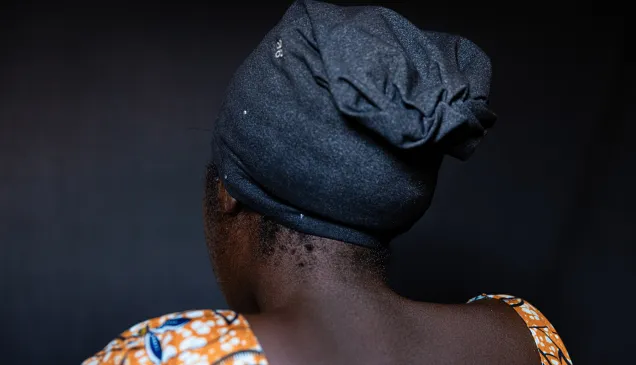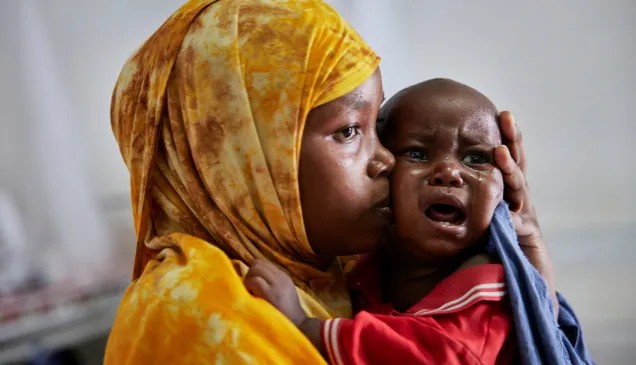Philippines: Stories of survival and hope rise amid conflict
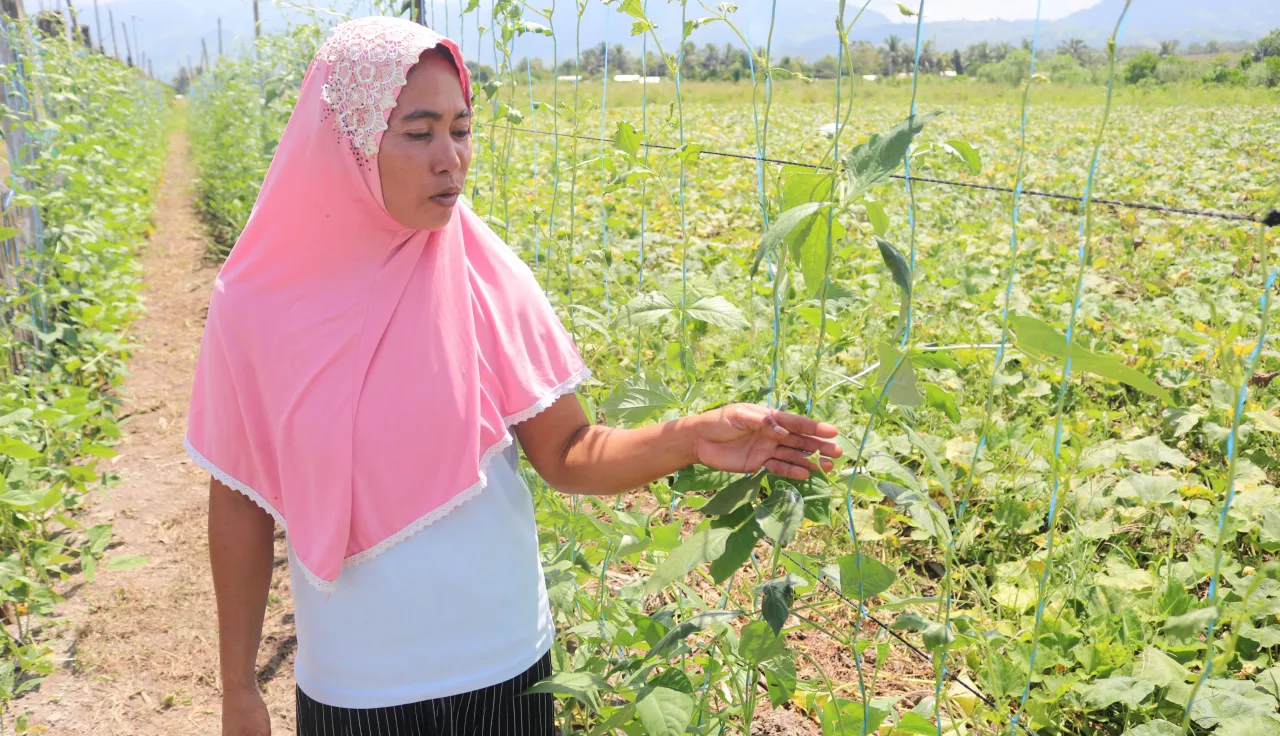
Thousands of people from Mindanao, Philippines, have been fleeing their homes for decades because of protracted armed conflicts. Among the different levels of impact on their everyday lives, their displacement has resulted in lost livelihood opportunities for many residents.
While many Mindanawons continue to suffer from instability because of the conflict, some have been able to rebuild their lives. A few have also set up their own successful businesses through the microeconomic initiative (MEI) programme of the International Committee of the Red Cross (ICRC). The programme provides vocational training, grants and microcredit support to people affected by conflict and disabled people. A microeconomic grant can be used to either start or expand a business venture. It also places beneficiaries at the heart of the decision-making process, giving them greater ownership of the income-generating project.
Here are a few stories that give us a peek at the hope and courage that people affected by conflict muster every day to deal with their challenges.
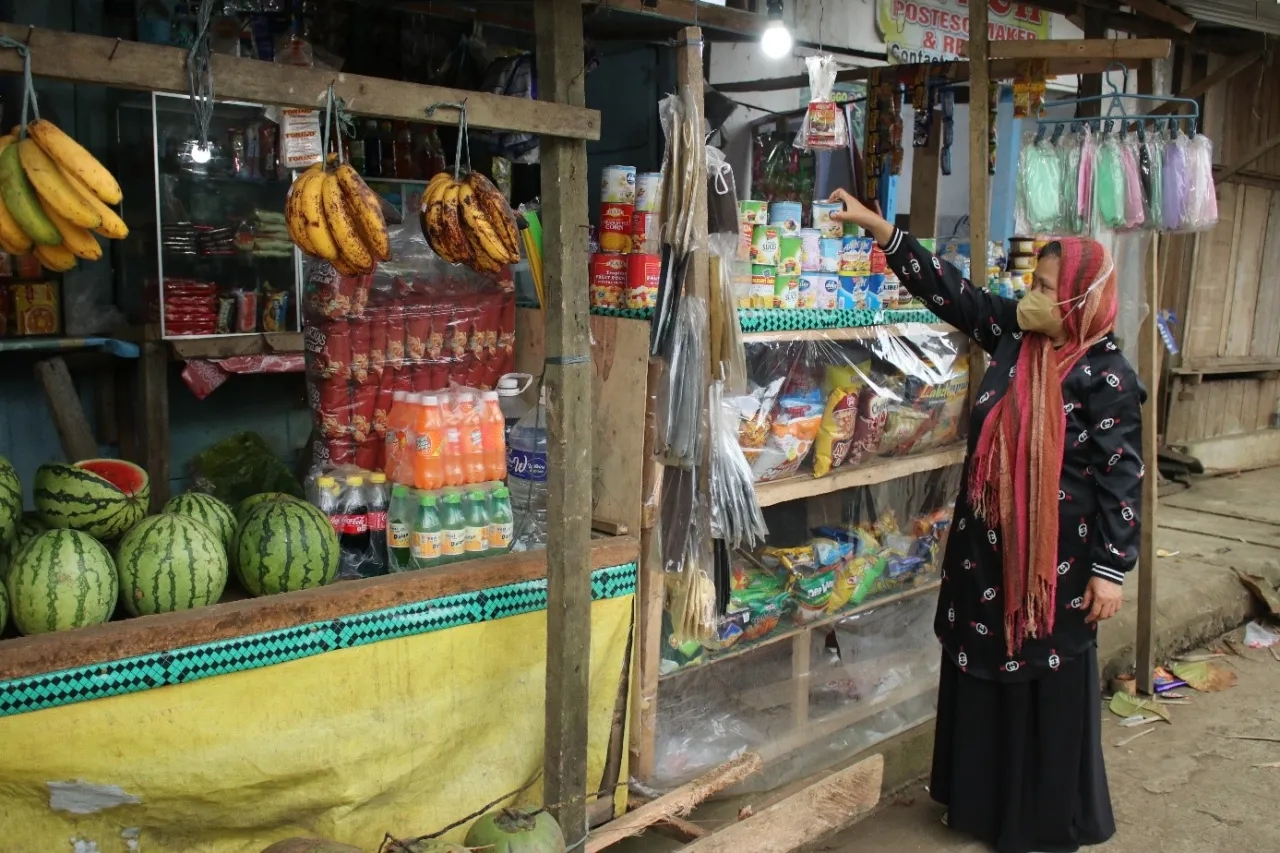
A little strategy, and a lot of consistency to defy the odds
Hadiyah's* life is marked by loss and a sudden turn of events. Yet the 42-year-old is holding on to faith and family, doing everything she can to rise again.
Hadiyah was once a resident of Marawi, a bustling city full of shops and small businesses, and the proud owner of a successful shop in Padian market where she sold warm, home-cooked meals. Hadiyah's shop was doing well and she earned a decent income. Two of her sons had gotten married and established their own businesses while her younger children were pursuing their education and weaving big dreams for themselves. Everything was going well for the family until one sunny day in May 2017 when armed conflict broke out in Marawi.
Hadiyah immediately called her husband to check in on him and their children.
"[But] the situation escalated quickly. The next thing I knew, I was already in Pantar, Lanao del Norte, with two of our sons who were working with me at the store," recalls Hadiyah, five years after the siege.
"It was devastating to leave the store and our house that we had put years of labour and hard work into. [Because of the conflict] they were reduced to nothing but rubble," she adds. After a week of separation, while Hadiyah was reunited with her husband Daud* and seven other children, her youngest son could not be located.
"My world turned upside down when he disappeared. It was like his disappearance cast a dark cloud over our family. Life had been getting better for us till crisis struck," says Hadiyah.
For months since the conflict broke out, Hadiyah and her family lived in an evacuation centre in Saguiaran town. With nothing more than the clothes on their backs, they relied on aid from humanitarian organizations and the government for survival. The little money Hadiyah had saved was spent in searching for her missing son but to no avail.
The family then relocated to a transitory site in Saguiaran, Lanao del Sur. But because of limited financial assistance, they struggled even more. Daud worked as a carpenter, while Hadiyah grew crops in their backyard but money continued to be tight and their children often went hungry.
"There were times when we ate only one meal a day," she says. With no hope in sight, Hadiyah had no choice but to send two of her children to General Santos, a city some 360 kilometres away from Saguiaran, to work for their relatives.
Help came through the ICRC's microeconomic initiative, which helps beneficiaries start their own businesses and generate income. Hadiyah used the cash grant she received to open a corner store along a busy highway in Poblacion, Saguiaran, selling sugar, coffee, soft drinks, soap and some fruits.
The cash grant became a turning point in Hadiyah's life.
"I just needed the capital to start [my business] again. When I received it, I did not waste any time and set up a small store along a busy highway where I stocked products that I knew would sell easily. The location helped to draw in customers and business picked up over time," says Hadiyah, who began earning enough to support the family again and was able to get her sons back to live with her.
But success did not come easy. Hadiyah shares that there were days when she had no customers and the products did not sell. Worse, some of the food items either rotted or expired.
"Running a store is a gamble. Profit is not constant and success is not guaranteed. You have to be consistent. Some days are definitely better than others. In fact, I just opened my second store. Alhamdulillah," she says.
Daud has also joined his wife in managing the booming business and they plan to expand even their first store to sell groceries for a more sustainable income. Sharing tips that they have learned as entrepreneurs, Hadiyah says one has to be strategic about what they sell.
"You have to take advantage of peak seasons too. For example, during Ramadan, canned milk and fruits are popular. And when labourers are busy with construction work, I sell cooked meals. Right now, soft drinks have been selling the most. I store them in a fridge that I bought using my grant. Pair your consistency with strategy and you are good to go," she exclaims.
While Hadiyah is happy that they can provide well for the family and send two of their younger children to school, she cannot stop thinking about her missing son, Hakim*.
"Not a day goes by when I do not think about him," she says tearfully.
She holds on to the hope that he managed to survive the conflict and will one day be reunited with the family.
(*Names have been changed to protect identity.)
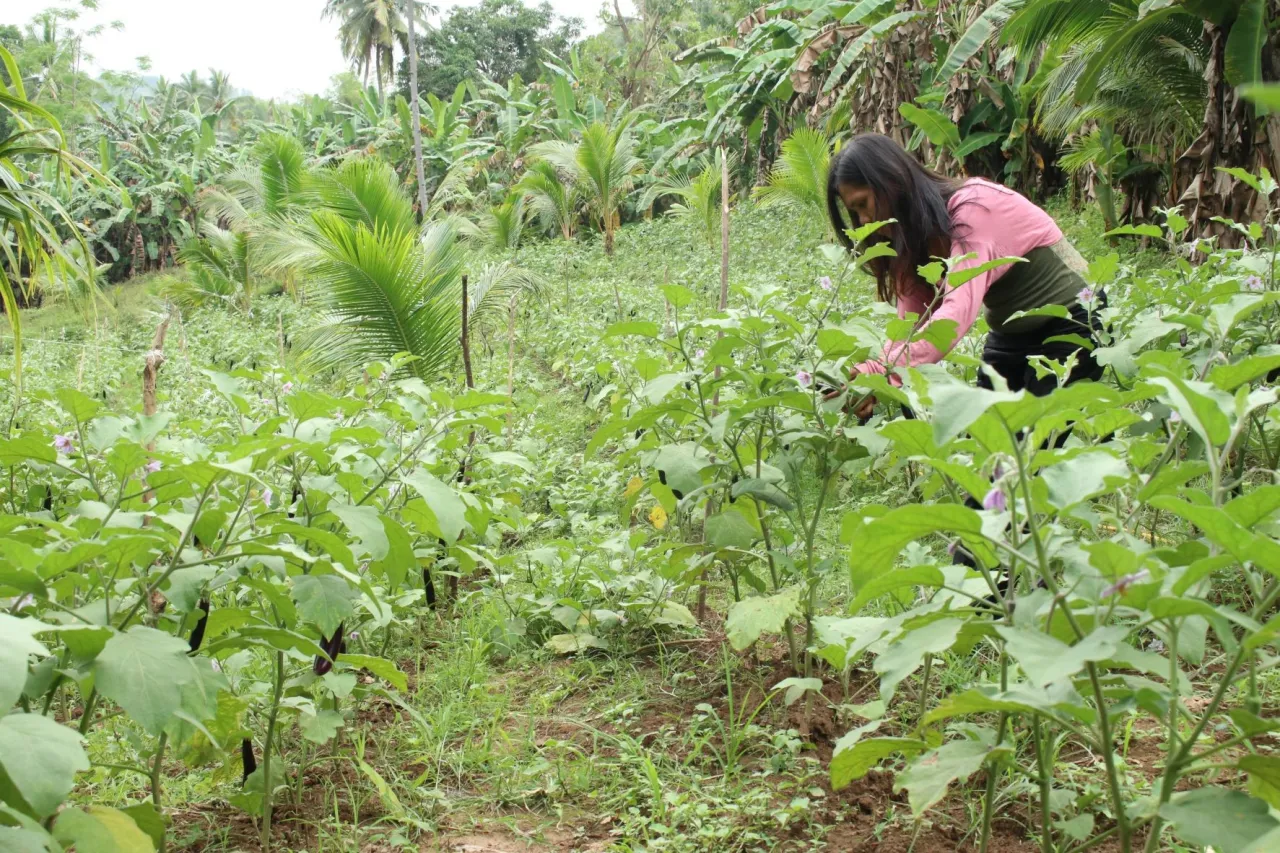
Planting the seeds of a better future
Myrna*, 32, was pregnant with her second child when armed conflict broke out in Marawi in May 2017. Her husband Gabriel* was trapped in the fighting, leaving Myrna heartbroken.
Moving to Marawi City from Iligan City had been Gabriel's decision. He had hoped to find more work opportunities and earn well for their growing family. At first, life seemed to be looking up for Gabriel. He landed a decent-paying job as a construction worker and was able to send money to his wife twice a month. However, in his eighth month of working in the city, conflict broke out and he was one of those who was caught amid the hostilities. Gabriel called Myrna soon after the violence broke out to assure her that he was safe. That turned out to be their last conversation.
Myrna was devastated when she could no longer contact her husband. While grieving her loss, she also became worried about her children and wondered how she would raise them alone. She started farming vegetables and on weekends sold rice cakes in her neighbourhood.
"My first son was four years old and my delivery date was drawing close. I was tired from working all the time, but I still could not earn enough to pay for all our needs. I had to rely on my parents for help even though they also struggled financially," says Myrna.
Three years after Gabriel's disappearance, Myrna met Robert*.
"He treated my children like they were his own and after some time proposed that we live together. I thought a lot about it and finally accepted his proposal. I know it's what Gabriel would have wanted for us," says Myrna.
Being with Robert gave Myrna a chance to slowly rebuild her family.
"Robert owns land in Iligan City that we wanted to developbut did not have the resources to do so. We ended up working with a middleman who loaned us seed, fertilizers and money which we paid back during harvest time," she shares. However, the middleman set the price of the produce much lower than the market price because of which the couple earned just a little money after all their hard work.
This cycle went on for quite some time before they received a grant from the ICRC which they used to clear their debt and buy their own raw materials. They stopped relying on middlemen to finance their farm or sell their vegetables and started selling their produce directly to customers at better prices.
"Getting the grant was a huge relief. It allowed us to really reap what we sow," says Myrna.
In addition, the couple was also able to cultivate previously unutilized parts of their land to grow Chinese kangkong (water spinach), cucumbers and string beans that can be harvested several times a year. Apart from spending on their daily needs, they used the extra income to build their own house.
Despite these gains, Myrna continues to face new challenges. In December 2021, Typhoon Odette triggered a landslide and destroyed some parts of their farm, making those patches unsuitable for farming. During the dry season, the cucumbers she planted also withered and the farm's yield decreased.
"It was really disheartening but we had to keep making the best of what was left. Fortunately, we still have customers who buy bulk quantities of whatever vegetables we manage to produce.
We are also planning to rent land for cultivation. Together, we are pushing forward one step at a time," says Myrna.
Myrna and Robert now have a child of their own and, like Gabriel's dream for his family, Robert aspires to see that the children have a decent future.
"I'd like to think that Gabriel sent Robert to us. Wherever he is, I hope he is assured that his family is thriving," says Myrna.
*Names have been changed to protect identity.
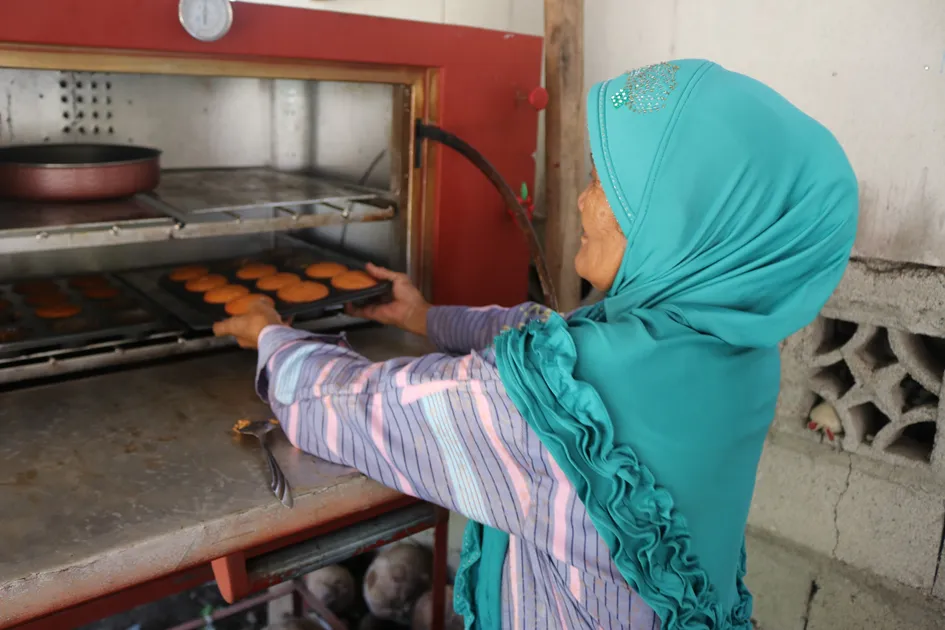
The sweet taste of success
When 58-year-old Maisola walked ten kilometres to flee the fighting that erupted in her community in 2020, she was gripped with fear. She vividly remembers the sound of gunfire and explosions ringing in the background as her family grabbed their few belongings and left their home in their small village in Ampatuan, Maguindanao. Maisola recalls feeling an odd combination of relief and anxiety at that moment.
"The first time I had to leave my home because of armed conflict I was only around eight years old. As I grew up, displacement became a constant reality for my family. I even gave birth to my firstborn in an evacuation centre," says Maisola.
Convinced that returning to their former residence would be almost impossible, Maisola sought refuge in the home of a relative in a nearby village. She set up a small store and sold coffee, local delicacies and mamon (sponge cakes) to make ends meet. To create mamon, she used an old oven (pugon), but soon realized that it wasn't good enough to make the kind of loaves of bread she had in mind.
A passionate baker, Maisola shares that she had learned the skill from her in-laws who used to own a bakery. It was one way for her family to become self-sufficient, but she needed a better oven to grow the business.
"Around that time, I came across the ICRC's income-generating programme to help families that are displaced by conflict. I shared my life story and my desire to buy an oven with the ICRC staff and was eventually given a cash grant," she says.
Maisola used the first instalment of the cash grant to buy a new oven and some ingredients to make bread. With the second instalment, she set up a small stall just outside her current home.
In less than two months, Maisola earned back the capital spent on the eatery just by selling mamon. She also ensured that her children continued their education (one child is in high school and one is about to graduate from college). She shares that she was not able to finish school because of the protracted conflict, but is determined to do everything she can to make sure that her children do not suffer in the same way.
Maisola has learned a lot from her journey as an entrepreneur. However, the most important life lesson she has learned is about giving back to the community. She allocates a portion of her income to sponsoring public events, where she serves mamon for free.
"If you won't give back, you won't receive anything," says Maisola.
Looking to the future, Maisola says she wants to expand her business further, baking and selling other types of breads such as pan de coco (coconut bread) and pandesal (salt bread), which are favourites in her community.
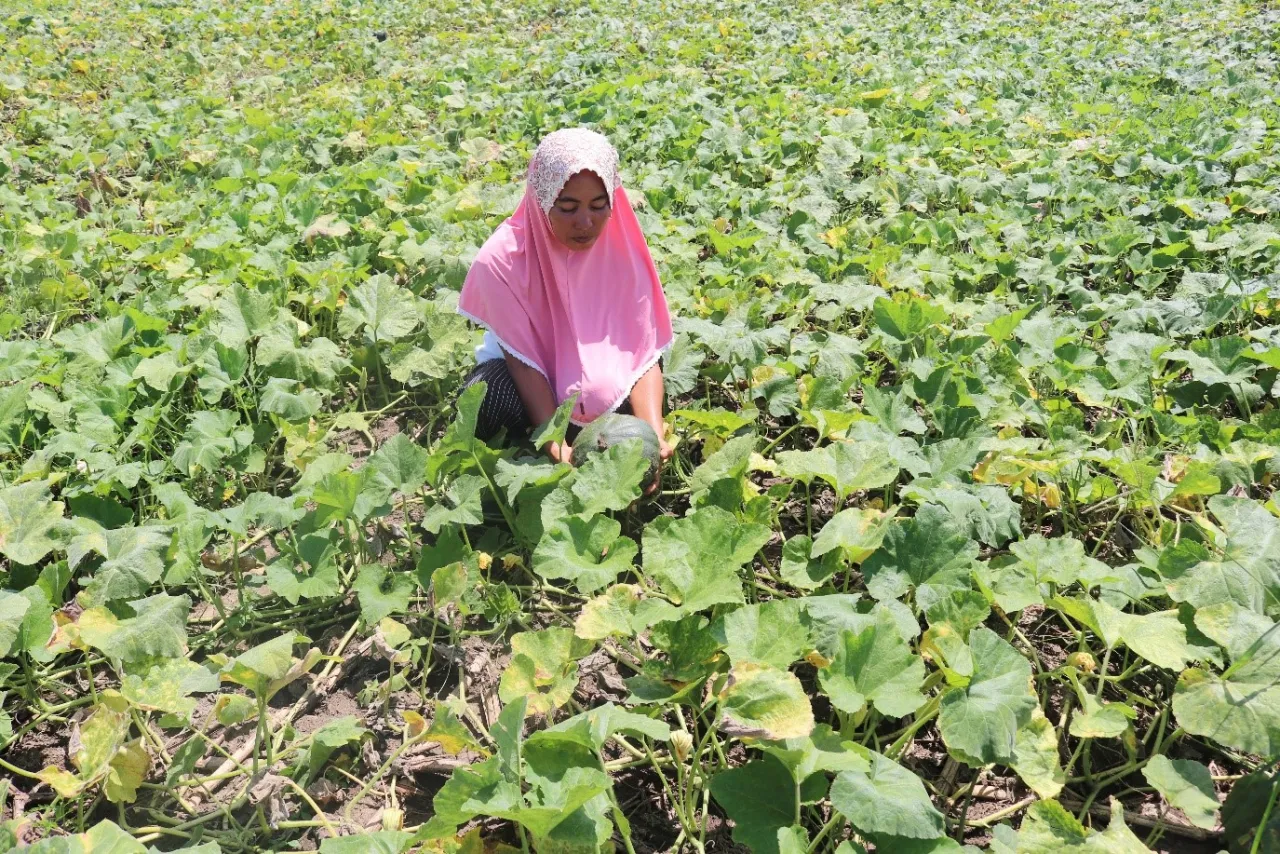
A resilient spirit pays off
Giving up is an unfamiliar word for Parida. It is simply not an option.
For years, Parida has been working as a farmer in a small village in Ampatuan, Maguindanao. She spent her days cultivating her own farmland, where she planted vegetables like bitter gourd, cucumber and squash. It should have been an idyllic life, except for the protracted armed conflict in her village. Parida and her family would occasionally flee the fighting, only to return home later. When a fresh round of fighting erupted in 2020, Parida and her family were once again forced to leave their home and farm. This time, Parida had a sense of foreboding that they may not be able to return.
Without means to support themselves in their new home in another sitio, Parida and her husband Jory were forced to borrow money and sell their calf, a prized possession that they had taken with them while escaping the violence.
"My husband did not want to sell the calf. We had planned to sell it at a later date to pay for our daughter's education as she will soon go to college. But I cried and told him we did not have a choice because we did not have enough resources to even feed our children," says Parida.
Determined to make life better, the couple leased a piece of land and grew watermelons and corn. But a combination of bad weather and market forces led to crop failure. Instead of paying off their debt, Parida and Jory incurred even more debts. Undeterred, they decided to grow squash, hoping to bounce back. But when harvest time came, the market value of vegetables dropped dramatically.
"I cried so hard. No one wanted to buy our harvest. It was Ramadan and we couldn't feed our children anything other than the vegetables we had," says Parida.
The family suffered in various ways from the multiple setbacks. Her children lost weight and Jory got sick from the mental and physical exhaustion of farming. They almost began to lose hope of things changing. Then a buyer from Cagayan de Oro dropped by their roadside stall one day and bought all their produce. They paid off some of their debts from the money they earned from the sale.
Sometime later, the ICRC chose Parida as one of the people from Salman to be given a cash grant to restart their livelihoods. She leased two hectares of land, bought high-quality squash seeds, fertilizers and several farm tools with the money. The grant also enabled Parida to help two other people from Maguindanao who needed capital to start their own farm. She agreed to finance their farm and divide the proceeds among the three of them.
But Parida did not stop there. She also helped her siblings and relatives by letting them sell their produce in her stall. With hard work, keen business acumen and the ICRC's grant, Parida and Jory can now provide a better quality of life for their children, all of whom are pursuing their education.
"It doesn't matter if I am very tired. What is important is that I see my children getting closer to their dreams and graduate. I pray that we can help them reach their goals while we are still alive," says Parida.
She adds that they want their children to enjoy a good life, especially when they are gone. "We do not want them to experience the hardships that we have had to endure in this life. I want them to live happy lives and provide for themselves," she says.
But Parida also confesses that despite the success in vegetable farming, she still worries about the future.
"I always fear displacement. I wish everyone who has been displaced can find stability, provide for their families and live with dignity. If we pray wholeheartedly and our deeds are good, we will get through it," she says.
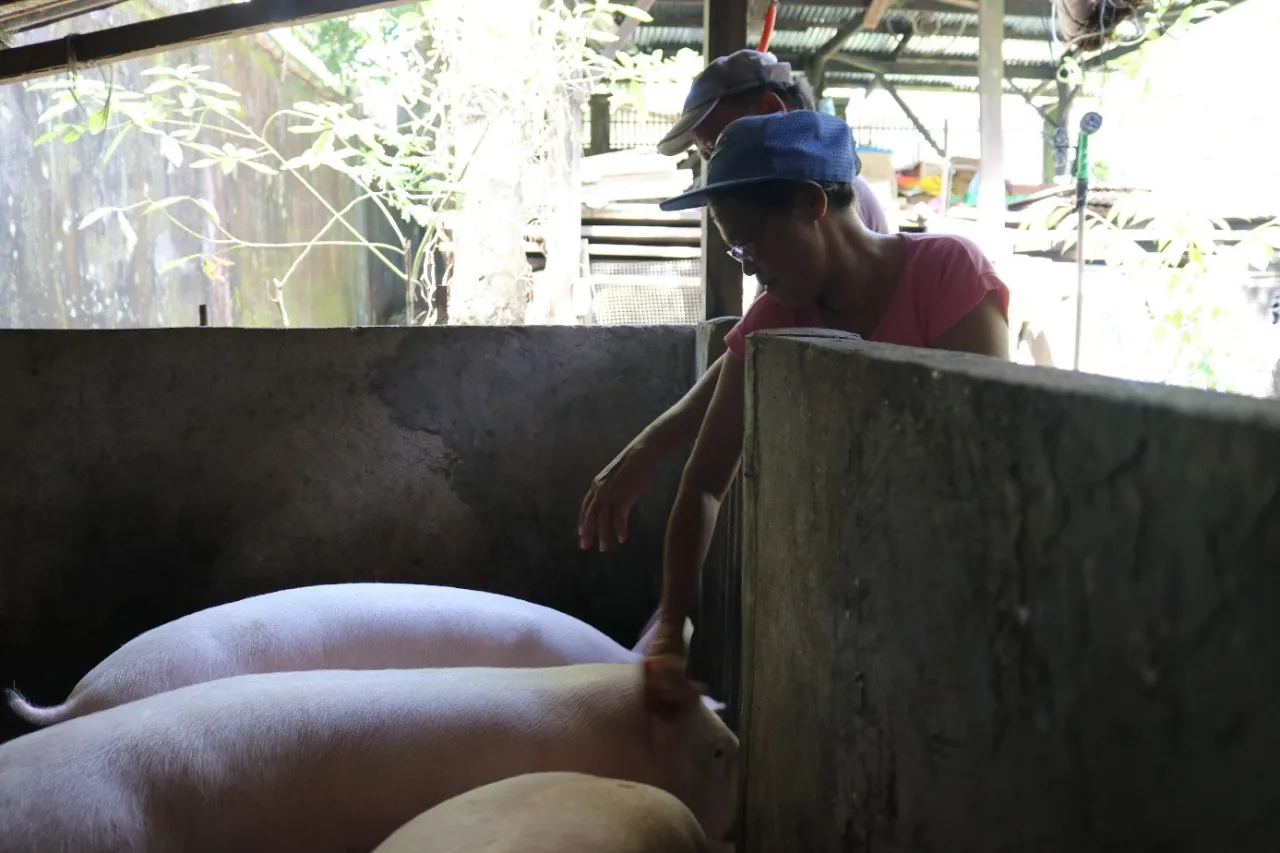
A mother's dream fulfilled
When Lita's* youngest son went missing, it felt like the end of her world.
He was studying in Marawi in 2017 and was about to graduate that year. He had planned to work in Iloilo. Lita had hoped that he would support the family after graduating from college and that life would become a little easier for them. But Lita's life changed forever when the armed conflict broke out in Marawi in 2017. Lita vividly recollects the day she learned that her son was missing.
"My son was a working student. He told me that he would be staying a few more days in Marawi to help prepare for the town fiesta before coming home. That phone call was my last conversation with him," says Lita, who has not heard from him in the last five years.
She kept herself busy by taking care of her grandchildren and tending to her corner store in Surigao. But life threw her another curveball when the pandemic struck, forcing her to close the store and seek other means of livelihood.
Lita and her family were finding it difficult to make ends meet, which is why she was elated when she found out about the ICRC's cash grant. Lita decided to use the grant to do livestock farming, in which she and her husband had extensive experience.
"We wanted to start a piggery because we had raised animals like cows and goats when we were still living in Visayas," she says, adding that they bought a few piglets, which they intend to raise and sell in a few months.
"The assistance from the ICRC was a big help to jump-start our livelihood. Once we sell the pigs, we intend to buy another batch of piglets to keep the income flowing. My husband and I are happy doing this job," she says.
*Names have been changed to protect identity.
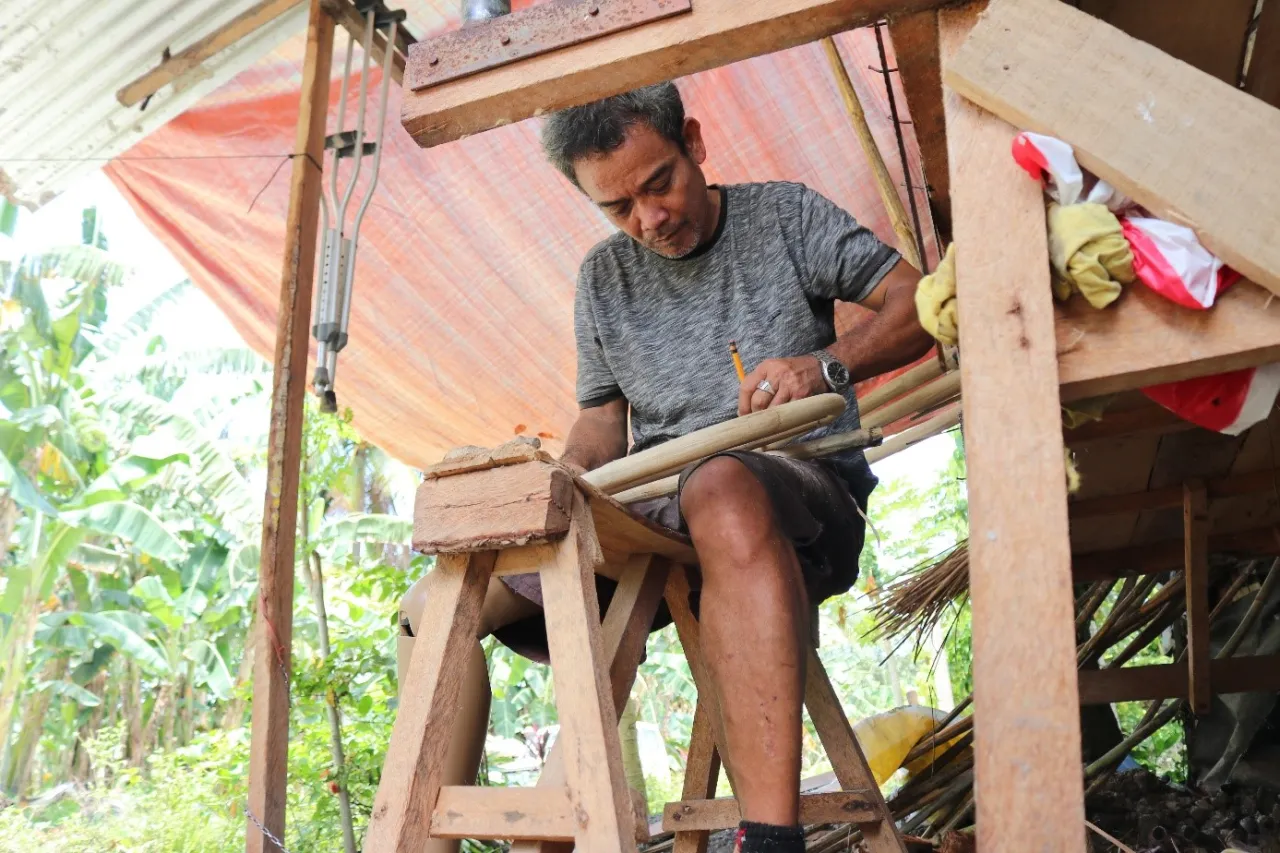
Pure passion: The life of an extraordinary craftsman
Sonny Tanada has seen everything: setbacks, sadness and victory.
He was living an uneventful life in Tagum City when, in 2009, he was injured in a motorcycle accident that left his right leg so badly damaged that it had to be amputated. As a result of his disability, Sonny was unemployed for almost ten years, until he met a furniture shop owner who took a chance on him.
"I owe him a lot," says Sonny about his former employer. "Like me, he is a person with a disability. He constantly reminded me to learn the craft because he saw the potential in me and that I could be running my own business someday."
Sonny says his former boss encouraged him to learn more about business. He attended numerous training workshops, but nothing caught his fancy or sparked his passion until he started learning how to make rattan furniture.
"I started [learning how to make] rattan furniture only in January 2020. It was not very difficult because I had previously worked in the construction industry. Though we got no salary, we were trained for free. I persevered because I wanted to develop my skills," he says.
Through his employer's contacts, Sonny learned about the Davao Jubilee Foundation (DJF), a non-profit organization that provides free physical rehabilitation services to disabled people in Mindanao. He took a leave of absence from his company to focus on his rehabilitation at DJF.
"My stay at DJF was free, including the food we ate every day. It was such a relief because we are poor. My father has passed away [while my] mother depends on my father's pension," says Sonny.
Sonny felt triumphant after he finished his rehabilitation in September 2021. His life was back on track, and he thought he could go back to his old job. But he was shattered when he learned that his employer had decided to close the business down and move to another city. Sonny was left jobless. Except for the small amount that he received from DJF, he had no other source of income and was forced to rely on his mother and siblings to support him.
Just when Sonny thought there was no way out, the staff of DJF told him about the ICRC's microeconomic initiative. He immediately applied for the grant, with the intention of opening his own rattan furniture store in Tagum City. When his application was approved, Sonny bought all the necessary materials and equipment.
"If my business proposal had not been approved, I would have been in big trouble because I did not know where to go," he says.
Sonny's furniture business flourished quickly, and he was able to become financially independent. "I receive a lot of orders so that I cannot accommodate everyone anymore. I never expected such a time," says Sonny with a hint of pride.
To accommodate his growing list of clients, Sonny is planning to hire an assistant. He also intends to ask his girlfriend, who currently works in Saudi Arabia, to move back to Tagum City since he can now support her too.
"I believe that I can provide for our needs now, so I want her to come home," he explains.
He shares that his success has made him believe that he can do anything, despite his disability.
"I see to it that I deliver quality work and take care of my clients. That is my secret to success... I am happy, and my clients are happy. They trust my work. Every time I reflect on this, I get emotional," says Sonny.
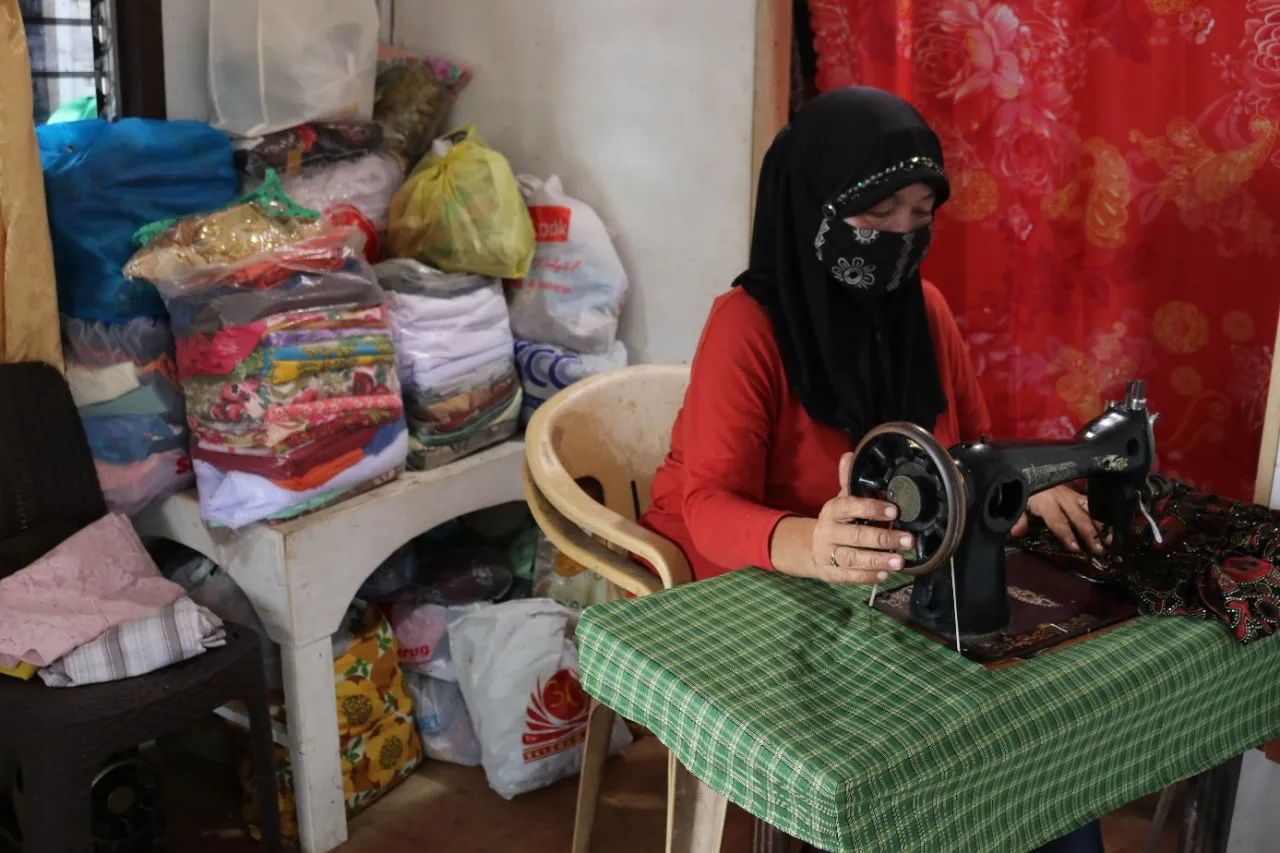
A dressmaker's brave new world
Like many residents of Zamboanga City, Hanifa* had a quiet, uneventful life. The 49-year-old was separated from her husband, but her children, daughter-in-law and grandchildren gave her much happiness. Her sons took on odd jobs, while she sewed clothes for her neighbours to make ends meet. Money was tight, but she was content.
Hanifa's life changed when three of her children decided to move to Marawi, located 430 kilometres away from home. The city had much to offer and her children wanted to move there to pursue their education and to see if they could make a better life for their families. To them, Marawi was the land of opportunities.
Hanifa continued to stay in Zamboanga City with her three other children. Everything was going well until May 2017 when Hanifa heard that armed conflict had broken out in Marawi. Phone calls with her children became her only source of reassurance.
"I would hear explosions and gunfire during our calls and fear for my children's safety," she says.
"One day the phone calls stopped and her family members could no longer be located. Five years since her last conversation with her three children, Hanifa is still looking for them. She doesn't know what has happened to them, but she dreams of the day when she can finally have her questions answered.
Since the Marawi conflict, the ICRC has been helping families of missing people like Hanifa's. Through the ICRC's microeconomic initiative, Hanifa was able to secure a grant which she used to buy food and other essential items. She also purchased a small boat to fetch water from the town centre and even earn money by leasing it to her neighbours.
The ICRC's financial assistance also helped Hanifa expand her dressmaking business. She makes the traditional Tausug outfit, supa-supa, and the Muslim prayer garb, gamis. Her talent and hard work have made it possible for her to gain more clients and also send her daughter to college using the income she earns.
But Hanifa's life remains incomplete as she continues to think of her missing children. She says that the boat she bought reminds her of them.
"I miss my sons. Sometimes I imagine them fetching water for me using that small boat," she says.
*Names have been changed to protect identity.


